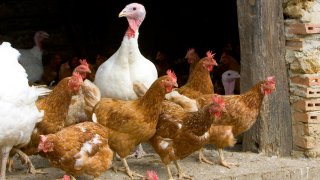
The Connecticut Department of Agriculture is warning poultry owners about bird flu after a flock at a Long Island home tested positive for the contagious disease.
CT DoAg officials said they have been reaching out to poultry and egg farms across Connecticut to make sure best practices are being implemented.
Anyone involved with poultry production from the small backyard to the large commercial producer is urged to review their biosecurity activities to assure the health of their birds. You can get information about that here.
Get Connecticut local news, weather forecasts and entertainment stories to your inbox. Sign up for NBC Connecticut newsletters.
“Now is the time for all poultry owners in Connecticut to take this risk seriously. Connecticut has a thriving commercial poultry industry and thousands of hobbyists who keep chickens, ducks, and other poultry. It is important that we do all we can to protect our birds," said Connecticut Department of Agriculture Commissioner of Agriculture Bryan P. Hurlburt.
Some of the actions steps recommended by the CT DoAg for backyard flocks include:
- Protecting flocks from coming into contact with wild or migratory birds
- Bring your birds inside.
- Restricting access to your property and your flock
- Clean and disinfect your clothes, shoes, equipment and hands
- Don't haul disease home if you have been near other birds or bird owners
- Don't risk disease from your neighbor
- Do not borrow equipment and poultry supplies from other bird owners
- Know the warning signs
- Report sick birds
- Signs of avian influenza include sudden increase in bird deaths, sneezing, coughing, nasal discharge, watery or green diarrhea, lack of energy, poor appetite, drop in egg production, swelling around the eyes, neck and head and purple discoloration of wattles, combs and legs.
The disease is described as highly contagious and often fatal for chickens.
To report sick birds, an unexplained high number of deaths or sudden drop in egg production, you should call the state veterinarian at (860) 713-2505 or ctstate.vet@ct.gov or you can call the UDSA at (866) 536-7593.
This year, bird flue has been found in commercial and backyard flocks in Indiana, Kentucky, Virginia and Nova Scotia.
At this time, the avian influenza does not present an immediate public health concern. No human cases of the avian influenza viruses have been detected in the United States, the CT DoAg said.



